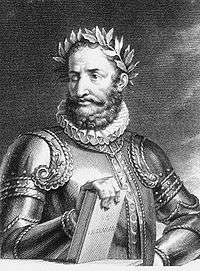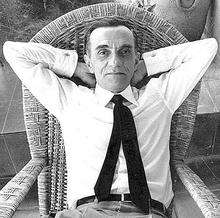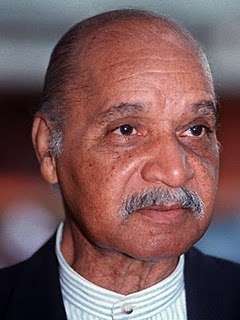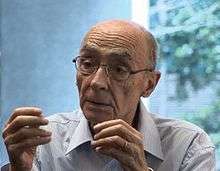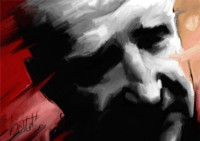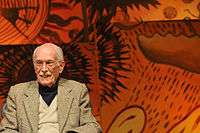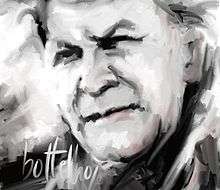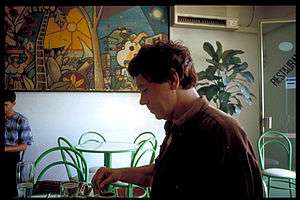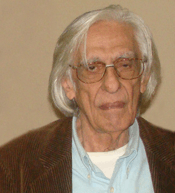Camões Prize
| Camões Prize | |
|---|---|
|
A painting depicting Camões, made by François Gérard | |
| Country | Brazil and Portugal |
| Presented by | Departamento Nacional do Livro and Fundação Biblioteca Nacional |
| Reward(s) | €100,000 |
| First awarded | 1989 |
The Camões Prize (Portuguese, Prémio Camões, Portuguese pronunciation: [ˈpɾɛmju kaˈmõĩ̯ʃ]), named after Luís de Camões is the most important prize for literature in the Portuguese language. It is awarded annually by the Portuguese Fundação Biblioteca Nacional (National Library Foundation) and the Brazilian Departamento Nacional do Livro (National Book Department) to the author of an outstanding oeuvre of work written in Portuguese. The monetary award is of €100,000, making it among the richest literary prizes in the world.
History
This award is considered the premier literary prize for an author in the Portuguese language for the entirety of their work.[1]
The Camões Prize is awarded annually, alternating between the two countries, and based on decision of a specially designated jury. The award consists of a cash amount resulting from the contributions from Brazil and Portugal, and is set annually by mutual agreement.
The Camões Prize was first introduced by the Additional Protocol to the Cultural Agreement between the Government of the Portuguese Republic and the Government of the Federal Republic of Brazil, dated September 7, 1966, which creates the Camões Prize, signed in Brasilia on June 22, 1988, and approved in Portugal by Decree No. 43/88 of November 30, 1988.[2]
This Protocol was replaced by a new one between the Portuguese Republic and the Federative Republic of Brazil, signed in Lisbon on April 17, 1999, approved by Portugal through Decree 47/99 in the official gazette of November 5, 1999.[3]
The Laureates
Winners per country
-
 Portugal – 12
Portugal – 12 -
 Brazil – 12
Brazil – 12 -
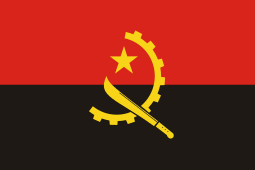 Angola – 2
Angola – 2 -
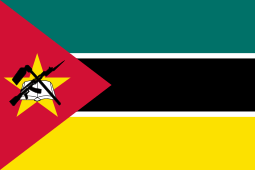 Mozambique – 2
Mozambique – 2 -
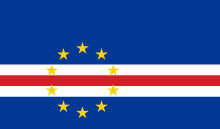 Cape Verde – 1
Cape Verde – 1
Omissions
- Elza Paxeco (1912-1989, Portuguese Brazilian)
- Fernando Namora (1919-1989, Portuguese)
- José Cardoso Pires (1925-1998, Portuguese)
- José J. Veiga (1915-1999, Brazilian)
- Paulo Freire (1921–1997, Brazilian)
References
- ↑ Standish, Peter (26 March 1997). "Prizes". In Verity Smith. Encyclopedia of Latin American Literature. Routledge. p. 1252. ISBN 978-1-135-31425-5.
- ↑ "Decreto n.o 43/88" (PDF). Diário da República. November 11, 1988. Retrieved June 18, 2015.
- ↑ "Decreto n.o 47/99" (PDF). Diário da República. November 5, 1999. Retrieved June 18, 2015.
- ↑ "Rachel de Queiroz". Encyclopedia Britannica. Retrieved June 18, 2015.
- ↑ Lucas, Isabel (2006-05-25). "Luandino Vieira recusa Camões por "razões pessoais"". Diário de Notícias. Retrieved 2015-06-18.
- ↑ Schiavo, Leda. "Literature: Year In Review 2010: Portugal". Encyclopedia Britannica. Retrieved June 18, 2015.
- ↑ Queirós, Luís Miguel; Coelho, Alexandra Lucas (2011-05-12). "Manuel António Pina ganha prémio Camões" (in Portuguese). Publico. Retrieved 2011-05-12.
- ↑ Andrade, Sérgio C. (2013-05-27). "Mia Couto é o vencedor do Prémio Camões 2013". Publico. Retrieved 2013-05-27.
- ↑ Carvalho, Cláudia Lima (2014-05-30). "O Prémio Camões 2014 é o brasileiro Alberto da Costa e Silva" (in Portuguese). Publico. Retrieved 2014-05-30.
- ↑ Queirós, Luís Miguel; Gomes, Kathleen; Coutinho, Isabel; Lucas, Isabel (2015-06-17). "Hélia Correia é a vencedora do Prémio Camões" (in Portuguese). Publico. Retrieved 2015-06-18.
- ↑ Marques, Ana Cristina (2016-05-30). "Raduan Nassar vence Prémio Camões de 2016" (in Portuguese). Observador. Retrieved 2016-05-30.
